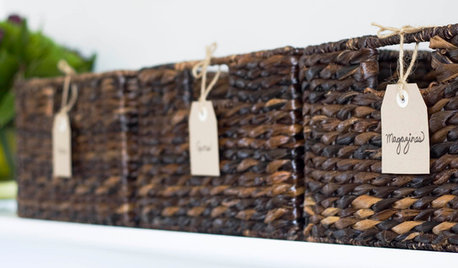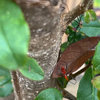organic method for getting rid of leaf miners?
I've got leaf miners on some of my flowers, does anyone know a good organic remedy for getting rid of them? It's just one plant, but for now. Thanks so much!
Comments (45)
Kimmsr
14 years agoRotenone is not today, and has not been for some time, an acceptable organic insect control because it is too broad spectrum and is known to kill aquatic things, even long after you apply it to your garden far from a stream, river, pond, or lake.
Once the egg hatches and the larva are at work inside the leaf there is nothing, acceptable to an organic grower, that will do anything about that larva, so you need to keep Ma Fly from laying her eggs on your plants and that means Floating Row Covers.Kimmsr
14 years agoRotenone is a topical application and is not effective for the larva of the leaf miner and the Organic Materials Review Institute, OMRI, places this in a "restricted" category for very limited use by those certified organic gardeners because of very real concerns about its environmental affects.
One can disagree with me about this but the fact remains that this is not a good product for organic gardeners to use, no more than Arsenic, also a "natural" product, is a good product to use in the garden.Related Professionals
West Milford Landscape Architects & Landscape Designers · Brooklyn Center Landscape Architects & Landscape Designers · Peabody Landscape Contractors · Arlington Landscape Contractors · Del Aire Landscape Contractors · El Segundo Landscape Contractors · Elkridge Landscape Contractors · Longmont Landscape Contractors · Pahrump Landscape Contractors · Soddy Daisy Landscape Contractors · Weslaco Landscape Contractors · Palmetto Decks, Patios & Outdoor Enclosures · Pittsburgh Decks, Patios & Outdoor Enclosures · Renton Decks, Patios & Outdoor Enclosures · San Antonio Decks, Patios & Outdoor Enclosuresorganicguy
14 years agoAs you said, it is APPROVED for limited use, which is what we are talking about here. The difference is that arsenic will kill you in small amounts, and Rotonone will not. That's like comparing a cannon to a pea shooter.
There is almost no negative enviromental effect if used properly and within reason, like everything else. If someone is losing their crop to leaf minors, that is reason enough to use this "approved" product.I don't know where you get your info from, but Rotonone does in fact kill leaf miners, even inside the leaf. I don't know if it seeps in through the thinned menbrane of the damaged leaf or what the mechanics are, nor do I care, but I do know from practical experience over many years that it is very effective and has saved many a crop for me. It stops them dead! Have you ever tried it or are you just saying what you read somewhere??
I believe in practical, commom sense organic gardening & farming, not a fanatical approach. The fact is, sometimes garlic spray, pepper wax and planting marigolds just doesn't cut it, and other, safe means are needed, other than toxic chemicals. Without them, there would be no organic farming! Again, I know first hand, having farmed for over 10 years successfully.
Kimmsr
14 years agoNone of the labels I have seen list leafminers as on of the target species, leaf hoppers, leaf rollers, but nothing about leafminers. It may kill the Fly that lays the eggs that hatch and become the leafminer, along with a large host of beneficial insects but since the labels also say it is a violation of federal law to use this product for purposes not listed on the lable, and since the leafminers are not listed, it is a violation of federal law to use it for that purpose, in addition to being an unsafe and environmentally unsound, product.
redwolf
14 years agoThere is an organic method of cleansing your plants and getting rid of pests above and below the ground. An added bonus is this product also strengthens the root system. It works fast. It is called Atomic Grow. It is 100% organic, non-toxic... You can read more about it by visiting the link below. I tried it on my magnolia tree which was doing very poorly, it had lost most of its leaves, and it is making a strong comeback.
Here is a link that might be useful: Atomic Grow puts Mother Nature in Charge!
organicguy
14 years agokimmsr,
There is a big difference between practical experience, and just reading from a label. Since you don't use Rotonone, I assume you don't have any experience with it first hand, so I am telling you from close to 50 years of practical first hand experience in the garden and on the farm, that it stops leaf miners dead in their tracks. . . I don't care what your label says!
And the label says it is to be used for it's intended purpose, which is to kill insects. It doesn't say you go to jail if you kill a bug not that is not on it's label. You're not serious about that, right? That argument makes absolutely no sense and borders on being fanatical.novice_2009
Original Author14 years agoUm, thanks. Is it safe to consume lettuce or spinach treated with rotonone? Exactly what is it?
Also, I have a question about row covers kimmsr. I put them on when I plant, how long do I leave them on?
I planted a packet of seeds near garden to attract beneficial insects. Wouldn't rotonone kill them as well as the bad bugs? I'm completely new to organic gardening, so any info is MUCH appreciated!!!
BTW, that atomic thing was funny. So obvious.JAYK
14 years agoAside from whether rotenone is a good choice for leafminers, it should be understood that under federal law, a registered pesticide label does not necessarily have to list a particular pest to be legally used for that pest. Some people confuse the list of pests on a label as limiting legal use to just what is listed. This is not the case. The list of pests controlled are not necessarily complete, they are just the pests that efficacy trials were conducted for. From a federal legal standpoint, what matters are the crops or sites that are listed on the label. The sites or crops, such as "orchards", "turf", "vegetable gardens", "roses" etc. are what matters from a legal standpoint. Unless your state has additional laws governing pesticide labels, if the site or crop is listed, the application can be legal as long as the rest of the label instructions are followed.
Here is a link that might be useful: label information
Kimmsr
14 years agoRotenone is a very broad spectrum poison that in addition is bery persistant in the environment and will kill aquatic life and is used in many places to do that. Some people will say that "I do not live near a water source so I can use Rotenone with no qualms", but it stays effective for that for a long time so someone 50 miles away from a lake, pond, river, or stream could be poisoning them even from that distance. Rotenone is also a very persistent poison that will kill more bees. Rotenone should never be the first thing you reach for when you have an insect pest problem.
I once used Rotenone and never saw that it controlled the leaf miner larva inside the leaf, there is little that will reach them inside the leaf except a wasp that will inject an egg into the leaf miner larva in the leaf. I stopped using Rotenone way back in the 1970's when we found that is not a really good pesticide for an organic gardener to use.
How long to leave Floating Row Covers on depends on what they cover and whether bees, or other pollinators, need to reach the flowers. If these pollinators are not necessary to pollinate the crop you could leave the FRC's in place about forever, while if the pollinators are needed (for saya squash) then they need to be removed when the pollinators need to get to the blossoms.
Read the link that Jayk provided and you will find it states, very clearly, that if a use is not listed on the label that product is not to be used for that.novice_2009
Original Author14 years agoThanks you guys! I live near a stream, so since the leaf miners are only on my columbines, I won't use anything. I don't want to hurt anything for flowers!!! Here's what happened though: Found the tell-tale lines of miners on leaf. I removed and discarded it. Just out of pure curiosity and need to use some basil leaves from veggie garden that were yellow- I placed them around base of plant. No more miners- on THAT plant. In another bed, they attacked another columbine plant!! They seem to really go for these. This one was more severe. I found it this morning, and tried the same thing again to see if it helps again, or was just a fluke or coincidence. I'm planting spinach and summer lettuce as a fall crop, I hope they stay away from it!
Do floating row covers really help with pests? Do they allow enough sunlight and oxygen and whatnot to affect plant growth? The one I'm using says 85% light transmission. Also worried in the humid, hot days plants might cook under them. What's your experience with them? Thanks guys!!rhizo_1 (North AL) zone 7
14 years agokimmsr. YOU need to read the information that jayk linked us to. You are misinterpreting or simply not understanding the language. It's a common mistake.
It is against Federal law to USE a product in a manner that is not labeled for such USE. For example, if the label states that the product is for trees and shrubs, then you must not use it in your veggie garden or in your home. The key word is 'USE'.
However, there is no possible way that a label can list every single darned pest that the product CAN be used on. It is perfectly legal to use pesticides for pests not listed, as long as you are following the INTENT of the label.
It's important to know the Federal guidelines in your own state, however. The state laws supersede (and are usually much tougher than) what the feds dictate.
novice, Neem products are listed and have shown to be effective against leaf miners. Timing of the applications are important, of course, with no matter what you use.
ronalawn82
14 years agoI am reminded of dieldrin and aldrin. The former was used for insect control on pastures; and dieldrin residues showed up in the milk of cows that grazed thereon. Unacceptable. Enter the use of aldrin.... no aldrin residue in milk. Later discovered that aldrin degraded into dieldrin!... to the extreme chagrin to all concerned.
So who will stand up and declare that ANY chemical is absolutely safe? Let him/her speak up and be called naive.novice_2009
Original Author14 years agoTrue ronalawn. No chemical is completely safe. My second columbine plant is nearly devoured by these leaf miners! It occured to me that the reason the other wasn't consumed is because it was covered. Shortly after I found leafminers, we had monsoon rains. That side of the porch doesnt have gutters, so to keep my plants from sitting in rain, I put a garbage bag on top of porch and stretch it across bed, and anchor it down. Water flows down it like a slide. So, without direct access to that plant, no flies to lay eggs. The other one was and is completely exposed. I guess it is doomed! Oh well. I hope when I plant my fall crops of spinach and lettuce, they aren't affected. I WILL use row covers!
Kimmsr
14 years agoRotenone and pyrethrins are chemicals. They are extracted from plants yes and they are "natural" substances just as Arsenic (which does not need to be extracted) is a natural substance. Simply because something is "natural" does not make it okay to use.
Whether or not Rotenone will kill leafminers is not the subject of debate because neither the manufacturer or the EPA has found this to be effective so leafminers are not listed on the label as a target of the product.Michael
14 years agoMind if I step in here to comment on the OP's question?
I have used a spray made from 70% neem oil on my onions for thrips for the last several years and found it to be quite effective. Yes, thrips will be found on the surface unlike leafminers but Neem may penetrate leaves so why not try it and see. Leafminers don't spend their entire life cycle inside the leaf so there may be hope for contact types.
Michael
markmein
14 years agoIt also looks like spinosad is a OMRI-accepted (or maybe OMRI not-yet-rejected, I can't tell) insecticide with applicability to leaf miners. The OMRI paper on spinosad talks about its adverse affects on bees (until spinosad dries) and fish & mollusks (if spinosad gets into water), but it looks like spinosad doesn't carry far in soil and doesn't do much damage to test mammals. I'm pretty sure my chard (and beets to a lesser degree) are being eaten alive by leaf miners. A spinosad-based spray is available from the same Monterey folks who sell Sluggo. (Their sluggo plus includes spinosad.)
So can we can add spinosad to the discussion before my swiss chard are all gone? Thanks.
Here is a link that might be useful: OMRI
Kimmsr
14 years agoFrom the OMRI report on Spinosad,"Reviewers generally agreed that the toxicological profile for spinosad is relatively benign when compared with other
insecticides. All found it compatible with organic production and believed that it has a place in organic agriculture.
However, all expressed concerns about the effects on beneficial organisms such as bees, aquatic organisms, earthworms,
soil micro-organisms, and parasitoids. Though spinosad is quickly photodegraded on leaf surfaces, it is degraded very
slowly in aquatic environments, and may be accumulated by oysters and fish due to its fat solubility."
As the report says Spinosad should be used by organic gardeners only with due care, it is not a general use pesticide.Here is a link that might be useful: OMRI on Spinosad
rhizo_1 (North AL) zone 7
14 years ago'organicguy', I wonder if your on-going exposure to rotenone (and other toxins) might be what has caused your chronic bad spelling. I'm just sayin'.......
Kimmsr
14 years agoThe goal of any organic gardener is to not need to use any pesticide. If you must repeatedly spray any pesticide then there is a problem with your plants nutrient balance which needs to be corrected. If there is a pest problem that does need some action then the organic gardener will always start with the least toxic means of control.
Columbines are notorious for attracting Leaf Miners and mine do get them, but since it does not really affect those plants I do not take steps to control the wee buggers since it is not necessary. If a food crop needs some help an organic gardener, starting with the least toxic means of control probably would use Floating Row Covers on those crops that do not need pollinators to set fruit.
Get your soil into a good, healthy condition so the plants you grow there will be strong and healthy and are better able to fight off insect pests without using broad spectrum poisons that will also kill of any beneficial insects that could help control those pests.markmein
14 years agoIf I understand the life cycle of leaf miners correctly, a row cover might help prevent an initial infestation, but wouldn't help once you have leaf miners. As I understand it, the problem is that at some point in their lives the leaf miners drop from the leaf to the ground to lay eggs. Unless they were in place before this step, the row covers wouldn't prevent re-infestation even if you removed all affected leafs, I think.
Some of my Swiss chard leafs are 12+ inches long and vibrant, so the plants seem fairly healthy despite the leaf miner damage. I've been removing up to about 50% of the leafs to be rid of the buggers, but I don't really seem to be getting ahead.
Kimmsr
14 years agoFailure to understand the life cycle of a leaf miner may explain why Rotenone appears to be an effective control. Trying to control leaf miners after they invade the leaf, in food crops, is the wrong time to even start and more than likely these larva will not even be in the leaf when it is harvested. If you know, from years of experience, that your leafy food crops will get infested by leaf miners and you do not take steps ahead of time to prevent that indicates a lack of necessary knowledge of organic gardening.
Spraying a poison around to control a problem that has existed for years is not an organic solution to that problem.Kimmsr
14 years agoThe proper time to put Floating Row covers in place is before the fly that lays the eggs that become the leaf miners. FRC's can be put in place as soon as you plant the seeds or the starts since at that time there is no need for pollinators to have access to the plants. If what you are growing does not require access for pollinators then the FRC's can be left in place until harvest time and theat will deny the fly that lays the eggs that become the leaf miners access to the plants and therefore you will not have any leaf miners and will have no need to spray a broad spectrum poison at all, thus saving you some expense which will increase your pofit, and maybe make your produuce more saleable because it will then be pesticide free.
emcalister1
14 years agoIf I could just jump in here. I do not use any pesticides in my garden. I've found that the more healthy the plant is the more it is able to fight off disease. Mycorrizae (sp) is crucial in how able a plant is to fight off pests. I have a massive compost system that is constantly cranking out high quality compost filled with mycorrizae.. I live in the Northwest so I use Steve Solomon's COF and seaweed extract. That's it. Year after year it cranks out huge, beautiful plants high in vitamins and phytomins.
scholl734
14 years agoI have leaf miners that wiped out my spinach crop and are destroying every new growth of my bright lights chard.
If I don't use rotenone, then what do you suggest. Its too late for row covers and they are pretty much wiping out my chard crop. I like to keep my garden organic, but I haven't heard any suggestions other than do nothing.
rhizo_1 (North AL) zone 7
14 years agoNeem is recommended for the control of leaf miners without the hazards of rotenone.
markmein
14 years agoThe leaf miner attack against my swiss chard seems to be dying off, without pesticidal intervention. If you google "leaf miners early summer" you'll find a number of sites that talk about leaf miners diminishing after early summer, depending on your area. (The UC-Davis site talked about July-Aug being LF Hell in the San Jouquin valley.)
Here is a link that might be useful: Sample leaf miner site:
novice_2009
Original Author14 years agowow. some people have passionate opinions about organic gardening and what that means! The dead horse thing at least gave me a laugh, thanks garbwarb! As a newbie, all info is appreciated tho. When I do my fall planting of lettuce, spinach, carrots, etc., I will use row covers to keep them out, as these don't need pollination anyway. I have a bottle of straight organic neem oil. Could I dilute this somehow to make a spray? Is neem safe for plants, and if on veggie crops, safe for my children to consume?
The columbines and nastridiums, I will let go. They are just flowers. I'm not growing veggies to make money, just feed my family and hopefully have enough left over for family and friends.jaxonj_att_net
13 years agoI dusted my entire garden one time with carbyl and about a week later there was a breakout of leaf miners that eventually killed all my tomatoe plants. I tried pyrethrin rotenone combo spray and in about two weeks later I brokedown and bought spinosad. It wiped them out, but it was too late. Ther was so much leaf damage my beautifully healthy plants all became sick and slowly died. Never do more than spot dust with carbyl and secondly if you have an outbreak of leafminers spinosad really works.
prairiemoon2 z6b MA
13 years agoWow, I'm surprised to hear people suggesting 'organic' sprays so readily on the Organic Forum. I wonder if we don't all kid ourselves about the safety of some of these products. There is a great article in Mother Earth News this month about 'pest proofing' your garden and the author suggests just that. I've been growing organically for 25 years and have never used any product organic or otherwise. Most of the time I do nothing. A few times I've tried some home made spray with garlic and a tsp of soap. Picking is one of my most used techniques.
As for leaf miners, I've had them in my columbine. They were really bad about 4 years ago. I haven't seen more than one leaf this year with one. All I did was cut off every leaf that had a miner in it every year until there were no more. The columbine easily recovered even when I cut off all the foliage and would grow back a nice fresh healthy rosette of foliage to last the rest of the summer. This year I haven't had to cut off any foliage.
I had a large infestation of aphids on lupine this year and I left them alone. In a few days I noticed ladybugs and a week later, I couldn't find an aphid.
Are there times when I have not been successful? Sure, cucumbers and squash have had those little squash bugs that cause the plants to wilt. But I haven't tried floating row covers which might do the trick. I have a small vegetable garden and I switched to other crops that gave me less work. I'd rather do that, then use products that I don't trust.
dicot
13 years agoYeah, my response to the leafminers in my citrus leaves has been benign neglect or handpicking the worst of the leaves. I guess that's not going to work with spinach, but it's worked fine for my tangerines.
prairiemoon2 z6b MA
13 years agodicot, I wonder if it would work with spinach. Wouldn't spinach plants regrow new leaves if you plucked off any effected by leaf miners? I realize there are time restraints, since spinach is only going to grow before it gets hot, but...I don't know, I'd experiment with using that technique before accepting that it wouldn't work. Anyway, if you were to attempt to grow the spinach and remove any effected leaves and keep at it until there were no more effected leaves, wouldn't you have a 'leaf miner free' zone to grow spinach in, at some point?
toadshade
13 years agoI have leaf miners and I have a pond I'm very fond of; fish, frogs, small water snakes (I like them)... and Rotenone is what they used to kill everything in the lake they first found snakehead in... and they weren't intending to mess around. That said, I was reading up on the life cycle and so on of leaf miners, and One site mentioned the use of Bt, which is obviously safe for aquatic life. I've been hand squishing them but they've gotten ahead of me and now I'm trying spraying with Bt since they Do have to poke their heads out now and then. Anyone else tried it? If not, I'll let you know in a week or so...
Kimmsr
13 years agoI have seen it mentioned here that Floating Row Covers, after you see the leaf miner damage would be too late. Well, yes, because you should be placing the Floating Row Covers way before the flies that lay the eggs that become the leaf miners appear, ie. as soon as you plant the seeds. Once the leaf miner hatches and enters the leaf it is well protected from any externally applied poison so what is left is some kind of systemic poison and those are all synthetics.
While Rotenone, Sabadilla, and some others are accepted by the OMRI people they have so watered down the organic standards, so the major food companies can use the "organic" label, that the standards used by OMRI are pretty much meaningless.bhart
12 years agoI came across a simple $3 solution that has helped greatly reduce the damage to my tomatoes from leaf mining flies. I came across this trick by accident after reading a suggestion to remove the damaged leaves harboring larvae. My plants were getting pretty damaged so I had tossed the leaves in a bowl of water, apple cider vinegar and a bit of soap then set the bowl in the sun in my garden to kill the leaves and prevent them from hatching. The next morning the bowl was filled with about 100 flies.
For the next week I removed any damaged leaves repeated the process and observed that the flies seemed more interested in the bowl than my plants. Now I empty my home made fly traps every other day and have significantly reduced both the pests harming my plants and any further damage. I also noticed that no beneficial insects are harmed in the process. It takes just about zero effort, isn't harmful to the environment and costs next to nothing. This is my first season gardening and I'm doing a lot of trial and error so perhaps someone else may also have some luck with this method.
growitorganically
11 years agoYou have to anticipate leaf miners and attack them at the egg stage. Eggs are laid by a small, iridescent fly. They're less than a millimeter long and found in a tight row, or rows, on the undersides of leaves. I watch for the first wave and smear them across the underside of the leaf with a finger. For larger infestations, a garlic oil soap spray applied to the eggs will kill them. It's important to get them before the eggs hatch, and the larvae burrow into the leaf. Once they're inside, there aren't many things that will touch them. I've seen earwigs chew through the pocket to get at the maggots, but that's about the only predator that attacks them inside the leaf.
If you have an infestation, pick off all the affected leaves and either put them in the middle of a hot compost pile, or into a plastic bag in the sun for a few hours. This will keep the maggots from dropping into the soil to pupate, and put a major dent in the second wave of leaf miners that comes after mid-summer.
Predatory flies like robber flies will attack adult leaf miners, and ground beetles will eat pupae they find in the soil, so encouraging these natural enemies helps prevent leaf miners from getting out of control.
I started to post a link to photos of leaf miner eggs, larvae, adults, and damage, but GardenWeb prohibits ANY links to informational pages if they have Google ads.
mackel_in_dfw
11 years agoIt has been established now that users of rotenone have developed Parkinson's Disease at a two hundred and fifty percent greater rate than the general population. I would be pissed if I bought vegetables that may be contaminated with this stuff. Rotenone is destructive to the liver as well as the nervous system in humans, and less than an ounce of it can kill a kid.
Speaking of the N word, it's completely naive getting yourself in a situation where you feel you got to use this stuff, I'm with Kimmsr on this one, the purist approach follows a deeper philosophy and understanding of how nature really works. Better planning simply makes the whole job just that more pleasant with the organic approach.
The purist approach has worked in our garden extremely well for over five years now, it is simply less work and more effective in every way. Part of the purist approach for me is low nitrogen, high nitrogen even when completely organic causes a lot of infestations becuase it temporarily weakens the plant. I bet everyone who is an advocate of organic pesticides is a high nitrogen advocate.
I scarcely bother with nitrogen anymore, focusing on micronutrients and carbon. I've been very surprised how many fewer problems I've had since almost completely backing off on nitrogen fertilization.
The university says it's the only major shortage of my soil. Bah humbug, I grow just about everything under the sun, fruit, vegetables, vines, bushes, trees... you name it and I live in Dallas, very tough weather. No infestations, no diseases, it's been a great learning experience defying conventional wisdom but totally fun. When I laid off the high nitrogen, I noticed, no more attacks.
The purist approach for me never had anything to do with politics or an existential gaia angst, I'm a right winger, it just clicked in my head one day that organic gardening should be cheaper, easier, and superior in every way. I stopped trying to mimic conventional gardening by substituting an organic product for a synthetic one, I got out of this line of thinking. Proper irrigation helps enormously as well in preventing disease and attacks. Nothing has lead me to change this thinking as the results have whispered in my ear for quite some time, now.
jolj
11 years ago"ANY chemical is absolutely safe?"
All plants & animals are filled with chemicals, we as a planet would die without them.
Are we going to fight about what is what or are we going to garden?jolj
11 years agoFound this on garden web.
Just because a pesticide is derived from a natural source and is approved for use on crops labeled "organically grown" is no guarantee that it is not poisonous to mammals or highly toxic to earthworms. For example, rotenone, an insecticide derived from a tropical root called derris, is as poisonous to humans as organophosphate chemical pesticides. Even in very dilute amounts, rotenone is highly toxic to fish and other aquatic life. Great care must be taken to prevent it from getting into waterways. In the tropics, people traditionally harvest great quantities of fish by tossing a handful of powdered derris (a root containing rotenone) into the water, waiting a few minutes, and then scooping up stunned, dead, and dying fish by the ton. Rotenone is also deadly to earthworms. However, rotenone rarely kills worms because it is so rapidly biodegradable. Sprayed on plants to control beetles and other plant predators, its powerful effect lasts only a day or so before sun and moisture break it down to harmless substances. But once I dusted an entire raised bed of beetle-threatened bush bean seedlings with powdered rotenone late in the afternoon. The spotted beetles making hash of their leaves were immediately killed. Unexpectedly, it rained rather hard that evening and still-active rotenone was washed off the leaves and deeply into the soil. The next morning the surface of the bed was thickly littered with dead earthworms. I've learned to treat rotenone with great caution.Here is a link that might be useful: Rotenone & earthworms by Steve Solomon
hopeforthefuture3
9 years agoLast year I had to deal with leaf miners for the first time. Somewhere on the intergoogle it was stated that the leaf miners repeatedly lay eggs that hatch with larvae that fall to the ground and from there get into the plants. It was recommended just to put garden paper around the base of the plants to break up this cycle. I did that and it solved the problem. Obviously, this a solution for the family gardener like me who is trying to protect his half dozen broccoli plants or whatever. Even for me, I'd like to find a less labor intensive solution.
Kimmsr
9 years agoThe adult flies that produce Leaf Miners put the eggs that become the larva into the leaf where the egg hatches and the larva then tunnels through the leaf. When the larva, chomping on the leaf, is ready it drops out to the ground where it pupates and becomes an adult which then mates and lays more eggs in leaves.
The best defense against leaf miners is Floating Row Covers.dclasikwashington
8 years agolast modified: 8 years agoI read a recent post online highlighting various ways in which gardeners can get rid of leafminers. For one, they can introduce neem oil to the plant. There are also beneficial insects that can be introduced to leafminer infected plants. These insects are beneficial as they will act on the larvae of leafminers and kill them. A plant or leaf becomes infested when a 'mother' leafminer injects a plant with its larvae. The larvae then grow in the plant, eating whatever is found in it. I attached the link to the article I read online just in case anyone would like additional references. 7 ways to get rid of leafminers.
I actually enjoyed this video as the process of how leafminers work was well captured.

















tcstoehr